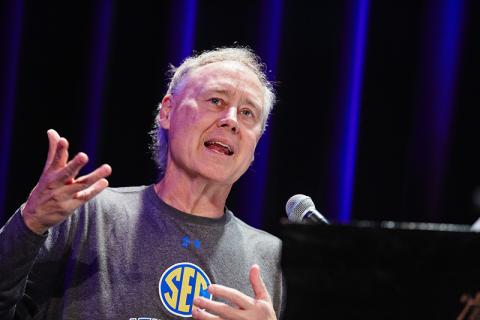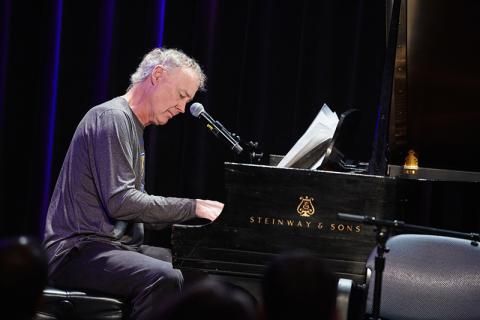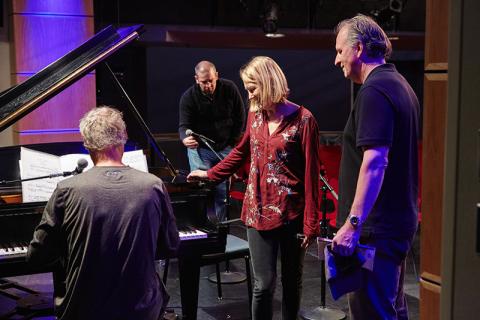Bruce Hornsby Shows Versatility, Shares Stories from the Road

Bruce Hornsby '74 talks about his wide-ranging music projects.
Dave Green

Hornsby treats the audience to some of his latest music.
Dave Green

President Roger H. Brown and Bonnie Hayes, Berklee's songwriting chair, look on during soundcheck.
Dave Green
Nearly 30 years ago, Bruce Hornsby launched his recording career with “The Way It Is,” an instant hit that preceded his Best New Artist Grammy in 1987, and later went on to be sampled by such artists as the late Tupac Shukar. While commercially successful, that song and others from that period—what Hornsby jokingly referred to as his "five or six hits from the cro-magnon era"—don't begin to paint the full picture of who he is as a musician.
“I’m a lifelong student and I refuse to be boxed into someone else’s conception of me,” Hornsby, a 1974 alumnus, told a small group of students, faculty, and staff at a clinic in the David Friend Recital Hall on October 16.
In this intimate setting, Hornsby showed his versatility, playing a handful of songs (solo piano and vocals) that fell outside his more well-known hits, and the stories behind those songs.
The set list for the clinic included: "Preacher in the Ring," a song about a snake-handling preacher; “Sh*t’s Crazy Out Here,” inspired by his son's experience as a basketball player for Louisiana State University; and “Neighborhood Watch,” a tune from his musical play SCKBSTD. The latter two were inspired by Schoenberg, illustrating Hornsby’s propensity for drawing from a variety of influences.
Indeed, the range Hornsby displayed underscores his reputation for crossing genres, borrowing from many styles from classical to bluegrass to jazz to blues; he’s collaborated with such artists as Ricky Skaggs, Jack DeJohnette, Bonnie Raitt, Christian McBride, Bob Dylan, Don Henley, Sting, and Shawn Colvin, and toured for a spell with the Grateful Dead after the band’s keyboardist died.
'Always in the Shed'
Hornsby was dressed in casual athletic wear, which matched his tone. He was at once self-deprecating and confident, and drew a lot of laughs during the hour-long visit. "I’m deeply serious about my work but I don’t take myself too seriously,” he said.
Following the music, Bonnie Hayes, Berklee’s songwriting chair, moderated a question-and-answer session. Hornsby, who is known for improvisation, stayed true to style, offering answers that often spun into new territory and always entertained.
He talked about his time at Berklee, where he studied for two semesters and frequented Boylston Street's legendary and now defunct Paul’s Mall and the Jazz Workshop; his approach to cowriting; the correct pronunciation for Appalachia (Appal-ATCH-ia); finding his own sound; and the art of being funny with gravitas.
On cowriting, Hornsby pointed to Elton John and Bernie Taupin, who famously compose music and lyrics separately. He said he takes a similar approach, and referenced projects with Chaka Khan (the two wrote a song for Spike Lee’s Clockers, one of several Lee movies Hornsby has composed for), Don Henley, and Grateful Dead lyricist Robert Hunter. “I’ve written four or five songs with Bob Hunter and I haven’t seen him since 1997,” he said. “Generally, it’s been two rooms,” he said, referencing Two Rooms, a John/Taupin tribute album on which Hornsby himself was featured.
A self-proclaimed late-starter, Hornsby didn’t begin his musical journey until the age of 17. At Berklee, he said: “I was always in the shed but I had a lot to catch up on because I started too late.”
But regardless of one's path, Hornsby emphasized that there’s no way around hard work. "I'm a grinder forever... and I'm still totally engaged with it. I'm here to attest, if you can do it, it's really, really fun."
This event was sponsored by the Umbrella Community Arts Center of Concord, Massachusetts, and the Berklee Songwriting Department.